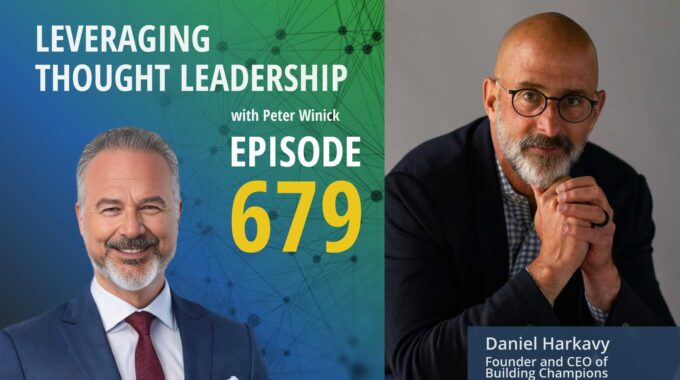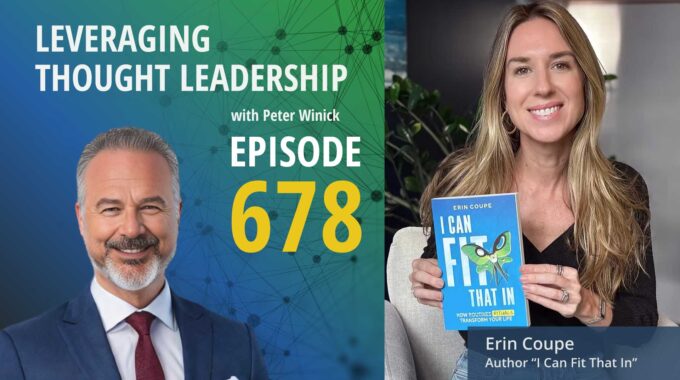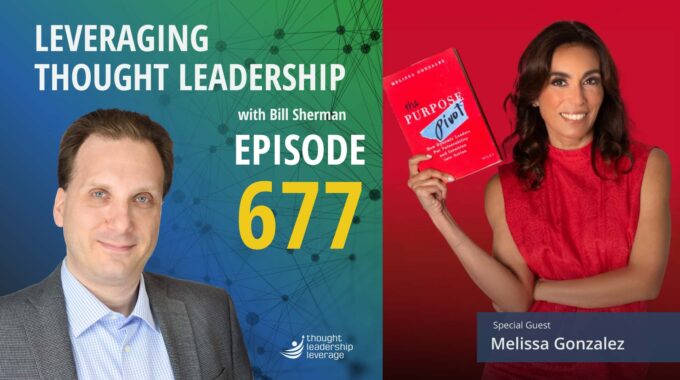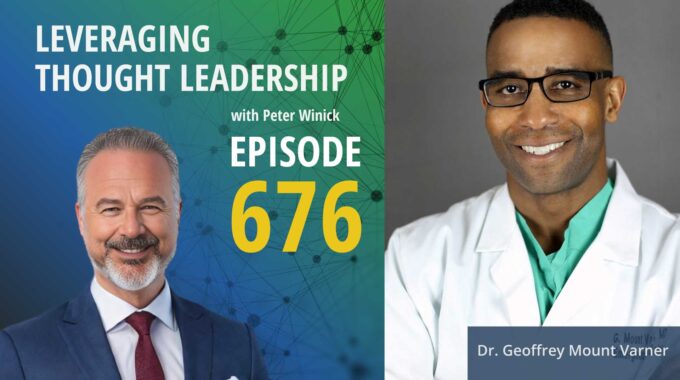A roadmap for leaders who want to multiply their impact — not their workload. This…
The Power of Purpose | Matt Hullander
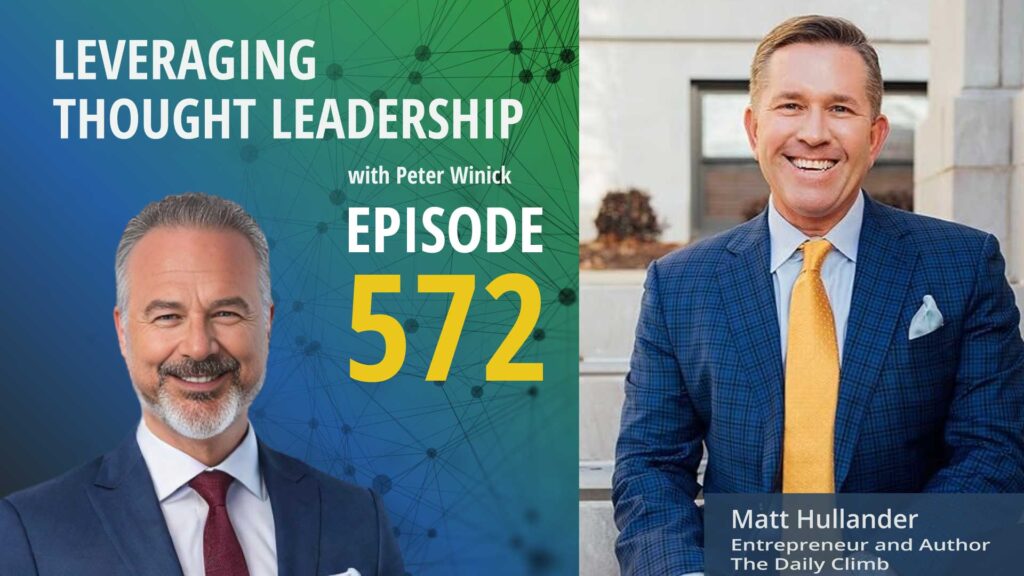
Expanding Horizons: From Home Improvement to Thought Leadership
A conversation with Matt Hullander about being a serial entrepreneur, changing perspectives, and writing a book.
In this compelling episode of Thought Leadership Leverage, host Peter Winick dives deep with Matt Hullander, a versatile entrepreneur from Chattanooga, Tennessee. Hullander, who has ventured into real estate development, e-commerce, private equity, recently authored the inspiring book “The Daily Climb: 10 Principles to Change Your Life.“ Today, he shares his transformative journey from business mogul to author.
After selling his successful home improvement company in 2021, Hullander faced a life-altering cancer scare. This experience shifted his perspective, prompting him to reflect on his purpose. At 50, he felt compelled to share his life lessons and stories to benefit others. Proceeds from his book, “The Daily Climb,” support teenage suicide prevention (The Jason Foundation), demonstrating his commitment to making a difference.
Hullander’s book challenges traditional goal-setting paradigms, advocating for a vision-driven approach. He emphasizes building habits that align with the life you want, rather than merely setting goals. Other principles include the importance of finding a guide, akin to his fly-fishing mentor, and the value of surrounding oneself with a supportive tribe.
Writing the “The Daily Climb” has created unexpected opportunities, opening new doors for Hullander, expanding his network beyond Tennessee and into various industries. The book has also led to speaking engagements, enhancing his credibility and setting him apart in his field.
Hullander encourages aspiring authors to leverage hybrid and self-publishing models. He highlights the importance of seeking guidance, sharing how his publisher, Foresight Publishers, helped him shape his book’s content and design. His message is clear: with the right support, anyone can bring their book to life.
Three Key Takeaways:
Embrace Life’s Challenges as Opportunities: Matt Hullander’s cancer scare transformed his outlook, leading him to share his experiences and insights through his book, “The Daily Climb.” This illustrates the importance of turning personal challenges into opportunities for growth and contribution.
Vision Over Goals: Hullander advocates for a vision-driven approach rather than traditional goal setting. By focusing on the habits and lifestyle that align with your envisioned future, you can create lasting change and achieve a more fulfilling life.
Seek Guidance and Build a Supportive Tribe: Hullander emphasizes the value of having mentors and a supportive community. Whether through a life coach, business guide, or peer groups, surrounding yourself with knowledgeable and supportive individuals can significantly enhance your success and personal growth.
If you have a vision for your business, then you’ll want to check out this article How Are You Applying Your Vision by Thought Leadership Leverage Founder and CEO Peter Winick.
Transcript
Peter Winick And welcome, welcome, welcome. This is Peter Winick. I’m the founder and CEO at Thought Leadership Leverage. And you are joining us on the podcast, which is Leveraging Thought Leadership. Today. My guest is Matt Hullander, who has a really interesting background. He’s an entrepreneur from Chattanooga, Tennessee. He’s got business interests in Tennessee, Florida, Alabama, Ohio and Arizona, a broad range of businesses, real estate development, e-commerce, private equity. He is a partner with a real estate development company. He’s got a whole bunch of other companies, and he’s written a book fairly recently that we’re going to touch on, which is The Daily Climb Ten Principles to Change Your Life. So he’s kind of a I, what I would call an accidental fall leader, if you will, in that he’d probably describe himself and I’ll leave it to him to do that more as a businessperson that happened to write a book that an author that became a businessperson. So welcome aboard today, Matt. 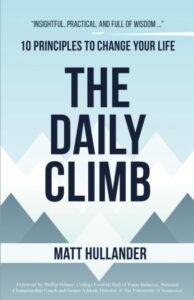
Matt Hullander Well, thank you, Peter, I’m glad to be with you. You made me sound really important with that introduction. And you’re right. I’m not an author. I just happened to write a book.
Peter Winick There you go. So you’ve got a lot going on the business side. I’m going to guess that you didn’t wake up one day and said, you know what? I’ve got a lot of time on my hands, and I want to fill it with a project. Therefore, I’m going to write a book. So how did the why and how did the book project come along?
Matt Hullander So I had my own home improvement company. Remodeling company. We were one of the largest in the southeast and covered, the whole right side of Tennessee, Selma, Kentucky, western North Carolina, Alabama, Georgia. And in 2021, I sold that business. And shortly thereafter, I had a cancer scare. I went in to my primary care physician, and he asked me to see an oncologist because I had really low white blood count and neutrophil levels, and they tested me for every virus and genetic anomaly. They couldn’t find anything. So, I ordered a bone marrow biopsy, and they said it would take five days to get the results. And those five days really changed my perspective and outlook on life. I won’t draw out that conclusion. I was diagnosed with frailty syndrome, which is something I can live with. But the real diagnosis I got was that I wasn’t living life on purpose. And I felt like at 50 years old, I had enough life experience that I wanted to put that in stories and help other people. And so, I went on the journey of writing a book. And now I appreciate your help. I’m out promoting it. I’m donating all the proceeds to a foundation my wife and I are active in that helps raise awareness for teenage suicide prevention. So, I’m not making money off the bill, but I hope to get it in enough hands that it impact.
Peter Winick Got it. And what would you like that impact to be? Because I’d imagine those five days that you spent between getting tested and getting results were not fun and easy days on the golf course.
Matt Hullander You know, I think in this one principle in the book, we talk a lot about mindset. And, you know, I’m a Christian and the book of Luke says, to whom much is given, much is required. And I started waking up every day with a new mindset of what’s going to come to me today, and I going to walk in every morning. We live on a dead-end street, and I try to do five miles, and that gets my day started. And I realized with the right mindset. It’s the principle of what goes around, comes around and. And then I challenge that one principle in the book, I challenge to the last 100 years of self-help gurus. And in a sense, I say screw goals. And I started doing research on why we have goals and how they work and how often people achieve goals. And so, I went to Google and it said that 8% of people keep a New Year’s resolution for a month. And 90% of those 8% keep it for the whole year. So I tried taking a new approach at that and say, I have a vision. I’m big. When I have my business. I’m really big on vision, mission and values. But vision and having that end of mine. And where do you want to get? And as an individual, what does that person look like? What habits do they have? And if I just take my word out the reason of those called the daily climb, those steps to I didn’t have the habits like that person would have, I think we can achieve more. I heard of another podcast recently when I was walking this morning and it described a gentleman was a runner and he wanted to run a 30-minute mile, but he was currently at a seven-minute mile. Well, if he set a goal of running a six-minute mile, it won’t just happen. He still has to eat the right way and train the right way. Get enough sleep. So I guess the big principle around the book is what goes around, comes around. There’s ten principles in the book and then like having a new way of looking at goals.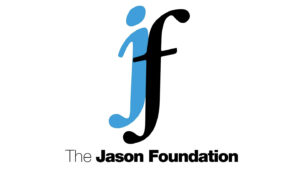
Peter Winick So I love that. So the book is really. An authentic expression of self that we don’t often get to do in business, right? So I would imagine when you do contracting business or any of your businesses, now, most of the customers or vendors or the employees that you deal with wouldn’t know any of these things about you prior to the book, unless maybe they have personal relationship, conversation, cocktail, lunch, that kind of thing. Is that fair?
Matt Hullander Yeah, I tell a lot of stories in the book. I don’t mean for the book to be all about me, but I do reference stories to help explain the principle, in that chapter. But, yeah, there’s a few things in here that most people didn’t know about me, but I wrote it for just the common person. I’ve been asked many times. Who is your audience? And it’s anyone. My, my, my daughter’s friends are reading the book, and my parents’ friends are reading the book. So, it’s been well received, and I really just wrote it to help make an impact, give people a different perspective. I consult with a lot of small businesses, you know, and for my former industry, which was home services, and I’m often surprised that they don’t have a vision and they don’t know their numbers. And so I like knowing the score of the game. We talk about that to, more. The principles is about having one scout find a guide and one’s called Find a Tribe and having a guide, like I go fly fishing and I always try to get the same guy. He does a great job. He knows the time of year. It is, the tide and the fish of what they’re eating. And, you know, a business owner also needs that business coach. And I as an individual, I even have a life coach out to, once a month. And that would be a guide, a tribe. It would be more like a peer group. So when I had my home improvement company, I was in a National Association of Home Builders peer group for about 15 years, and I wouldn’t have achieved the success I had or been able to sell my business like I did had I not had the relationship with the other guys in my peer group. I mean, I learned so much from you.
Peter Winick And if you’re enjoying this episode of Leveraging Thought Leadership, please make sure to subscribe. If you’d like to help spread the word about our podcast, please leave a five-star review at ratethispodcast.com/ltl and share it with your friends. We’re available on Apple Podcast and on all major listening apps as well as at ThoughtLeadershipLeverage.com, forward slash podcast.
I want to touch on something you and I talked about a week or two ago, getting preparing for this recording today, which was sort of unexpected opportunities that have arisen as a result of the book. So you didn’t write the book to say, I’m going to write this book because I want to grow this business 3% or find new clients or whatever. You wrote the book, it’s more passion, it’s more vision, it’s more mission, which is great. But then you told me a story, and we don’t have to get all the details of, you know, you’re out there speaking and doing things for your other businesses, and it gives you a strategic competitive advantage. Because if there’s ten folks that want to speak to an industry conference, yes, you’ve got the been there, done that credentials. But then there’s this other thing. Whoa, you wrote a book. Like, not a lot of people in your space have done that. And that really gives you an edge, an open innings of opportunities that others that might be, you know, just that that same level of success in your profession wouldn’t get that. You know, it’s a tie breaker if not a huge differentiator. Talk about that for a little bit, because I think people lose sight of sort of unexpected benefits that one might get from putting the thought leadership out there.
Matt Hullander It’s of the books helped a lot in that way. You know, most people have a big personal brand. And then they write a book, and they sell a lot of books because they’re well known outside of Chattanooga, Tennessee. I don’t have a huge brand, but I’m trying to promote the book. And so, as you alluded to, I’ve been in several meetings. I was in a private equity meeting out in, Scottsdale, Arizona a few weeks ago, and I got to do a book signing there, and I gave away almost a hundred books. But I met some people that are very influential in fundraising, and one of my businesses were fundraising now for, hospitality Group. So it’s opened the door for me to now go have meetings with these folks that might want to invest in one of my companies. Well, another example, I’m getting my e-commerce business. We’re working with Nashville singer songwriters and country music stars, and I’ve met with a couple of their agents, and I got to give them a book which shows that I have a little more credibility. Then who’s this guy from Chattanooga? So it’s definitely helped open doors for me.
Peter Winick Yeah. So now once you it wasn’t the intent. It wasn’t an objective. When you started down this road. How do you think about that as it relates to the business? Because I love that you’re giving away all the profits and all those sort of things. But if an outcome of writing this book is it can help you raise funds, put deals together, get access to deal flow, build relationships. People want to talk to people that are interesting. And quite frankly, it’s more interesting to talk to someone that wrote a book than someone that’s, you know, no, you know, like running a contracting company. Like, that’s only mildly interesting, right? Relatively speaking.
Matt Hullander Yeah, it’s opened a lot of doors because of that. And, you know, it wasn’t the Antia when I wrote the book. And honestly, most people you can Google this to, people don’t sell books and people don’t make money. They don’t make money from books, but people write books to help raise awareness for their brand. And then they’re selling you a course or a program or a conference. Yeah, that’s all great. And that’s get some of those. But that’s not my intent. I really don’t want it to be a full-time job. I’ve got other jobs. But it has been very helpful in opening the door. And I have been invited to speak at certain events because I wrote the book. But it’s more about relationships and just being in a room. I went to an event in Nashville with other authors, and now we’ve connected. There was a lady that wrote a book from Hawaii, and she’s reached out to me, and there’s a relationship there that might help in one of my other ventures. And the same for her. It’s the whole principle in my book about what goes around, comes around. So, I think my wife asked me, she’s like, well, you spent more money on this book than you do. And I’m like, well, maybe, maybe not. But you never know the opportunity that can come around because of it.
Peter Winick Well, but that may be maybe not is really the question, right? Because maybe if your wife says, well, we invested this in PR and get the book done or whatever, and then the ROI is strictly measured by number of units sold, time some marginal profit level per book. I hate to tell someone that. Right. My wife might be right, but your wife might be right now. Your counterargument is yeah, that’s right dear. But here’s some other things where we’ve made back, you know, ten on some multiple of the investment in ways that we never thought possible. And then the other variable might be time, right. There’s nothing, you know, the book that you wrote, as are most nonfiction business books, what I would call evergreen, right. Whether I read that book today or in a year or 5 or 10, I should have that same. Haha. That same, you know, moment of like, wow, that makes a lot of sense. You’re not writing about an election cycle or something that’s cyclical. So, you could get benefits from those books that we couldn’t even predict. Like what’s what is the benefit of that book going to be for you in three years? You know, who knows? But it could be there.
Matt Hullander Sphere, and there’s always a new audience. For me. There’s another country, and this book will be around when I’m dead. I wrote it in a way where all the principles would apply. Like you said, no matter what year it is, and I agree, she’s my wife. Also. You know, I take a lot of lunches, probably more than I should, and often I pay for the lunch. But it’s people seeking my advice. And he’s like, you know, you always go to these lunches, and you end up buying. And, but we are also I explain how blessed we are and where we live and what we have. And yeah, and I think it’s a combination of giving back. And, you know, that’s just the mindset that I talk about in the book. And I’ve met no one that has that mindset. That’s not been that stressful in many ways, but I’ve met a lot of people that don’t have that mindset that are still one. And about the poor old me and same old attitude. I just saw a guy from, high school recently, and I still think he was in 1991 and hasn’t had a reset since. And, you know, even though I had that cancer scare, I wish he could have had an awakening Mark. I had, and it would change in perspective.
Peter Winick Yeah. And then finally, as we start to wrap, does it always. In your opinion, does it always take some sort of an external awakening? Right? Like if you didn’t have the scare? I doubt the book would be here. Maybe it would have. Maybe something else would have popped in your mind. But you were busy running the businesses and driving this and driving that and didn’t have that time, that forced time or moment or opportunity to really reflect. So, does it always take? And it didn’t have to be medical like an external shock to the system.
Matt Hullander Well, it did for me, but I don’t think it does for, you know, a traditional author. I’m sure they go into the next book, and it’s not for that reason. And I had many reasons. We’ve had some. There’s one principle in the book that talks about failure. I actually, after I sold my business, I had this moment, decided I would run for mayor of Hamilton County. And it’s in the chapter plan to fail. So that tells you how that race lamp. But there’s many things. There’s many things that could be that external factor that gave me the motivation to write the book. And a lot of times it is that for other people. But I think for your traditional out there, they typically probably put a lot more time in it and have a more systematic approach. But I still think in the few months it took me to write mine that there’s enough. Yeah, nuggets in there that it’s beneficial to everybody and at least everybody. That’s unless all my friends are giving me these five-star reviews on Amazon. I think it’s been impactful.
Peter Winick That’s great. Any final word on someone out there thinking about taking the plunge? Like, hey, I don’t want to move, but some yeah, well, it doesn’t have to necessarily be writing a book, but really diving into some thought leadership in a way, because you’re passionate about it, even though it’s not part of who you’ve been or what you’ve done. Sure.
Matt Hullander You know, and I’m not overly educated. I’ve been, I’ve worked hard and learn from others and successful. But I went to a local county high school and got a two year college degree. So I’m not your typical author, but there are traditional publishers, and then there’s what they call hybrid publishers. Or you can self-publish, but if you find the right person to help you, though often what the company I use for publishing, I just took all my faults and got them out there. I wrote the book, but they give me help in which principles should come first. What order are the chapters? This is how you go get an ISBN number. You can get it uploaded to Amazon. So and you know, cover design and that sort of thing. So, it’s not all that expensive. For someone to do that and to have somebody guide you along the way. So I would encourage folks that have been nervous, that always wanted to, to just find the right person to help them get through it.
Peter Winick Now. Good advice. Well, I appreciate your time. Thank you for sharing your story and your journey and all the best.
Matt Hullander Thank you Peter, I appreciate you having me on and keep climbing.
Peter Winick To learn more about Thought Leadership Leverage, please visit our website at thought leadership leverage.com to reach me directly. Feel free to email me at Peter at ThoughtLeadershipLeverage.com, and please subscribe to Leveraging Thought Leadership on iTunes or your favorite podcast app to get your weekly episode automatically.


